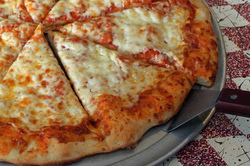
The column begins by stating the obvious: Americans eat lots of cheese. About 11 billion pounds in 2011. They don’t mention that the average American eats between 23 and 33 pounds of cheese annually, depending on the source of data. And, since I eat zero pounds of cheese, others must make up for me to get that average.
The dairy associations (US and international) want us to believe that, as the Sams article stated, “There’s no denying the benefits of the bone-building calcium found in our favorite cheeses.” Yes, calcium is important in bone metabolism. But how about casein, the milk protein? The opiate-laden casein is acidic, taking calcium from bones and flushing it out in the urine.
But your bones will weaken without milk! Nope. I get plenty of Vitamin D from sunshine and green leafy veggies. Same for Vitamin K and calcium. Even calves, after they’re weaned, stop taking their mother’s milk. They eat grass. And they do just fine.
An animal rights research group mentions the work of Dr. Colin Campbell of Cornell whose studies of six decades show a strong correlation between dairy consumption and osteoporosis, breast and liver cancer, and heart disease. In this video Dr. Campbell discusses his decades of research in the effects of casein. He puts it bluntly: “Casein [the main protein of cow’s milk] is the most relevant chemical carcinogen ever identified.”
A Harvard medical newsletter skirts the casein issue, but admits that exercise helps to prevent weak bones in later stages of life (rebound exercise such as jumping, running, or an activity that puts pressure on the joints). This newsletter points out that dairy products are often loaded with saturated fat, a risk factor leading to arterial plaques, which can cause heart disease and strokes. Oh no!
Another researcher confirms that dairy products, especially cow’s milk, can lead to broken bones in the elderly. He suggests a milk alternative: almond milk, or rice or soy milk. I've tried all three and I prefer almond milk.
Now, I don’t know about you, but I don’t want to get cancer and I want my bones healthy and solid when I’m 90. So I avoid cheese and other dairy products. And, for most Americans (who don’t know that meat and dairy products contain opiates, making them highly addictive) a switch away from cheese is tough. Cooks smother foods with it; they know what consumers like to eat. Recipes call for it constantly. And, accordingly, we eat a lot of it. Americans, along with people in Scandinavia, lead the world in broken bones of the elderly. It’s no coincidence.
So, the next time you eat at a restaurant, kindly request that your salad be cheese-free. It might actually taste better, especially when you consider the consequences.

 RSS Feed
RSS Feed